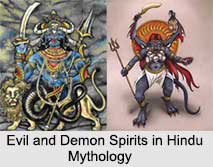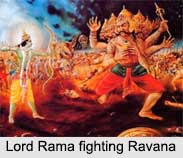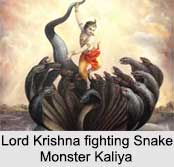 Evil and Demon spirits in Hindu mythology are formed depending on the cause and kind of death occurred to the individual. Death in an accident and formal discarding without proper funeral ceremonies or deaths inflicted by criminals and disposal of the body furtively without proper religious rites changes the transitional body into deadly and fiery ghosts or roaming spirits.
Evil and Demon spirits in Hindu mythology are formed depending on the cause and kind of death occurred to the individual. Death in an accident and formal discarding without proper funeral ceremonies or deaths inflicted by criminals and disposal of the body furtively without proper religious rites changes the transitional body into deadly and fiery ghosts or roaming spirits.
Forms of Evil and Demon Spirits in Hindu Mythology
There are two great classifications of such forms of evil and demon spirits in Hindu mythology;
i. One is created by the Gods during the creation of the world and thus brought into the world as "Demons". The demons usually act at the orders of the greater deities as Nandi of Lord Siva or the demons, who were decreed by Shiva to destroy the Yajna by Daksha Prajapati.
ii. The second category comprises of those demons, who were created due to man, rather to the spirits of men, who have once lived on the earth. The existence of these demons is derived from deceased spirits of dead human beings. All malignant devils are believed to have been originally human beings.
There are many other forms of evil and demons who has been once the dwellers of human bodies. They are mostly dreaded by the general mass and are therefore mostly worshipped to keep them calm. These are of three classes;
•Bhoot: It is spirit originating from a man, who has died of a violent incident either by accident, suicide or capital punishment. The one who has not had proper funeral ceremony performed later.
•Preta: It is the spirit of a malformed or crippled person or of one imperfect in some limb or organ or of a child who expires prematurely due to the omission of ceremonies during the creation of the embryo. It may not necessarily be an evil liable spirit.
•Pishacha: It is a demon formed due to a man"s vices. The ghost of a drunkard, liar, and criminal of any kind, adulterer or one who died as insane is a Pishacha. The Pishachas are malevolent and roguish. They haunt graveyards or take up trees as their abode. They may take hideous or striking shapes and even the appearance of men. Animal blood is their favourite food but they generally feed on corpses and may even dwell in dead bodies. They may even enter human beings through the mouth and may bring about diseases and unpleasant affections of all kinds. They may take the shape of a dog, cat, serpent or other animal.
Nature of Evil and Demon Spirits in Hindu Mythology
Demons may be of all and any ranks and may have either distinguished or of low castes, as the cheating devils, deceitful devils, gaming devils and others. A criminal who dies in a nasty accident, his sins and crimes live after him in the shape of spiteful demons, as assassinate devils, theft devils, infidelity devils and so on. Such demons are always on the search for weak-minded people and influence them to commit crimes of similar type. Incarnated diseases, calamities, disasters, hailstorms are strongly believed to be the activities of demons.
Worship of Evil and Demon Spirits in Hindu Mythology
No real worship is actually performed for these demons. There are hardly any temples raised to satisfy them. The only place of worship is a sheer heap of earth piled up in a mountain shape, near some tree, or a similar creation formed with bricks that is painted with long streaks of white. There are no special prayers said at such shrines, but offerings of food are often arranged in such customs.
In southern India, devil worship is more religiously practiced as compared to the North India. The main reason for this could be the dominance of Shaivism on a wide scale or that during southern invasion, when the Dravidian met with the aboriginal tribes. These tribes appeared to them as if resembling those of the demons. As the Aryans advanced their energized imagination, they converted these powerful enemies into supernatural giants and veritable demons called "Rakshasa". With the passing days, Aryans, Dravidians and indigenous mixed together, the fear of demons and generated many more customs to keep away these demons.
Every form of superstitious fear of evil spirits, ghosts and roguish ugly demons play an important role in their day-to-day lives. Therefore, devil worship and propitiation still prevails among the villagers.




















